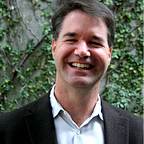PMF is the Founder’s Marshmallow Test
The Marshmallow Test famously studied children who could resist eating a marshmallow for a period of time in order to receive more marshmallows later. Researchers found a good link between this ability to delay gratification and measurable life outcomes of those children, including SAT scores, BMI, educational attainment, etc. It’s pretty widely accepted that the ability to delay gratification is a solid contributor to life happiness.
Founders face a very significant marshmallow test very early in their companies. Many many founders find good market traction with an idea. Very very few keep experimenting until they find insatiable demand and true product market fit. My quantitative definition of that is 20% MoM growth and 80% organic leads for new users.
For a long time, startups were mechanically difficult because they involved making hardware, or standing up bunches of physical servers, and a lot of very low-level development. The opposite is true for most startups today. There is no physical product, your servers are taken care of by AWS, you build off of large open source frameworks, and now even your people aren’t even in one physical office. But we still develop companies as if there was a huge cost to change and experimentation. And we still have a culture that the way to get to insatiable demand is to start with good demand and iterate on it. When change was hard, that was the only path. Now it is not the only path.
My experience is that incremental change rarely finds a 10x bigger opportunity for a seed stage startup. In my first company, NetGravity, we iterated on our idea for an ad server for six months, talking to dozens of potential customers, before figuring out what to build. And then within three months, realized that the much bigger opportunity was in moving to completely real-time ad serving from the static model we had started with. And a couple of years in, it became clear that moving to a fully cloud-based model where customers didn’t install our software would be far better for them and us. The whole process was very intentional, but very slow.
Fast forward to today, this type of intentional discovery is 100x easier. When my friend Neil D’Souza set out to figure out his next company, he had a dozen ideas. Every week he would run a set of experiments and look for strong demand. If he found it, he would double down in that area and see if he could 10x demand again. He spent an entire year going through the ideas, but eventually landed on getsetup.io, a senior to senior live learning community and social network, which has some of the strongest product-market fit I have ever seen. In a year, he built something with much higher PMF than NetGravity, a company I took public and sold for $750 million.
Back to the marshmallow test. The marshmallow for a founder is good product-market fit. Moving from “your idea sucks” to “someone likes your idea” is a really incredible feeling. Almost every founder grabs that marshmallow and wolfs it down. They go into execution mode, hire people, and build a business around it. The iconic founder does not. She is happy about that early signal, but has in her mind what insatiable demand looks like and keeps experimenting until she finds it. That could happen with this idea or it could happen with a later one.
One of the reasons I almost never invest in seed companies alongside larger firms is that they have a post-PMF mentality. They want to understand the northstar metrics and evaluate the team on improving those metrics. That is a very good way to create a moderately successful company. Unfortunately, great seed stage companies are creative rather than execution plays. Just as developing an execution cadence is so crucial to later stage companies, developing a creative cadence is crucial to seed companies. Their job is to find the absolute maximum demand in the space they are exploring. The best cadence is to run a new uncorrelated experiment every day. While demanding, the likelihood that you miss the point of highest demand with this approach is quite small. It is incredibly easy to abandon this kind of rigor and delayed gratification, eat the marshmallow and take a good idea and execute on it. Great founders resist that, and great investors do too.
